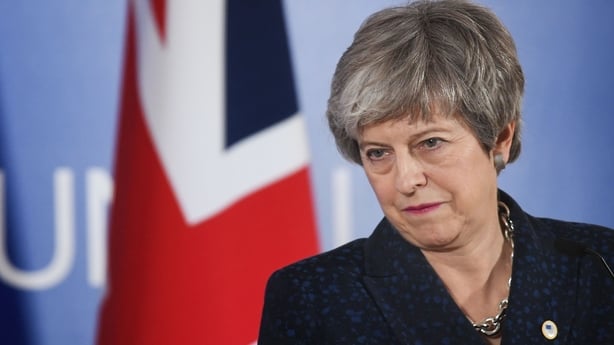Britain must find a way to leave the European Union in an orderly fashion rather than trying to oust Prime Minister Theresa May, British finance minister Philip Hammond has said.
When asked by Sky about newspaper reports of a plot to oust Mrs May by senior ministers and whether she had run out of road, Mr Hammond said: "No. I don't think that is the case at all."
"Changing prime minister wouldn't help us," he said. "To be talking about changing the players on the board, frankly, is self-indulgent at this time."
When asked if he was trying to get Mrs May's de-facto deputy, David Lidington, to take over as interim prime minister, Mr Hammond said: "That's not the case."
"I'm realistic that we may not be able to get a majority for the prime minister's (Brexit) deal and if that is the case then parliament will have to decide not just what it's against but what it is for," he said.
When asked about possible options for Brexit, Mr Hammond said he was not sure there was a majority in parliament for a second referendum but that it was a coherent proposition.
"It's clear there is going to be an opportunity over the next few days for the House of Commons, if it doesn't approve the prime minister's deal, to try to find a majority behind another proposition that it can take forward," Mr Hammond said.
He added: "What type of way forward Parliament can agree on so that we can avoid what would be an economic catastrophe of a no-deal exit and also what would be a very big challenge to confidence in our political system if we didn't exit at all."
Mr Hammond said changing PM would not "solve the problem", but he refused to be drawn on whether his colleagues had approached him asking him to make an intervention.
However, he acknowledged that "people are very frustrated and people are desperate to find a way forward in the just over two weeks that we've got to resolved this issue".

Mr Hammond said Parliament would be given the chance to hold indicative votes on alternatives to Mrs May's Brexit deal this week.
"One way or another Parliament is going to have the opportunity this week to decide what it is in favour of, and I hope that it will take that opportunity - if it can't get behind the Prime Minister's deal - to say clearly and unambiguously what it can get behind," he said.
But Mr Hammond said a decision had not yet been made on whether Tories would be given a free vote on the matter.
He also said a second referendum was a "perfectly coherent position", telling the programme: "I'm not sure that there's a majority in Parliament for a second referendum but it's a perfectly coherent proposition - many people will be strongly opposed to it, but it's a coherent proposition and it deserves to be considered along with the other proposals."
Responding to the rumours about plans to oust Theresa May, David Lidington, the de facto deputy prime minister, has said he has no desire to take over from Mrs May.
He told reporters in his Aylesbury constituency: "I don't think that I've any wish to take over from the PM (who) I think is doing a fantastic job."
"I tell you this: one thing that working closely with the Prime Minister does is cure you completely of any lingering shred of ambition to want to do that task," Mr Lidington added.
"I have absolute admiration for the way she is going about it."
Meanwhile, Brexit Secretary Steve Barclay has warned that the risk of a general election would increase if MPs took control of parliamentary proceedings and brought about a "constitutional collision".
Speaking on the Andrew Marr Show, he said: "If an amendment goes through where Parliament takes control of the order paper then that leaves open the door to Parliament then legislating to take no-deal off the table.
He further added that this scenario was something that Brexiteers like him would see as a massive risk to Brexit because if Brexiteers and Parliament votes against the deal and also votes to take no-deal off the table then the only option is to then have European parliamentary elections.
Mr Barclay said if the Commons takes control of the order paper and votes for a different outcome, it would "potentially collide with fundamental commitments the government has given in their manifesto", though he said the vote itself would "not be binding".
Explaining the scenario, he said: "What Parliament has done is vote for a number of contradictory things so we would need to untangle that but ultimately, at its logical conclusion, the risk of a general election increases because you potentially have a situation where Parliament is instructing the executive to do something that is counter to what it was elected to do."
Prime Minister Theresa May is making a last-ditch bid this weekend to win support among British MPs for her EU divorce deal ahead of another pivotal week in the Brexit process - but faced reports her leadership is under imminent threat.
After securing a short delay to Britain's departure from the European Union beyond March, Mrs May appealed directly to MPs to contact her "over the coming days as parliament prepares to take a momentous decision".
"I hope we can all agree that we are now at the moment of decision," Mrs May wrote to MPs on Friday, as she softened her tone after lambasting them earlier this week for their intransigence over her plan.
The House of Commons has already overwhelmingly rejected her deal twice since it was struck with the EU last year and the DUP, her parliamentary allies, indicated Friday they remain opposed.
The British government is set to publish its plans for the House of Commons next week on Monday.

